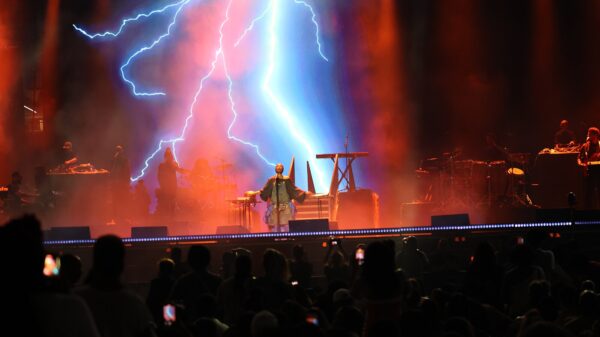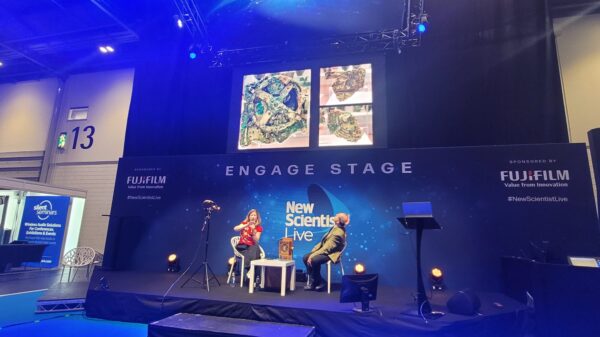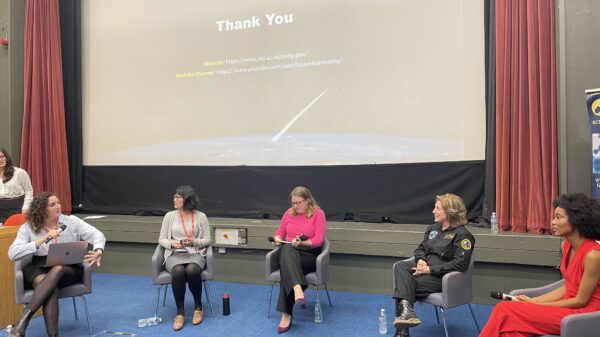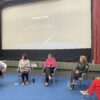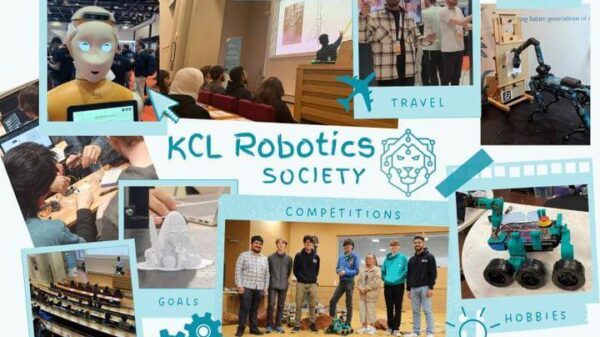Three teams from KCL Research in Electronics Society (KCL RIE) took part in Unibots UK, an autonomous robotics competition hosted by Cambridge University Robotics Society, alongside Heriot-Watt Robotics Society. The challenge tasked teams with building bots to collect various balls in a dynamic arena, including a remote-controlled ‘snitch’.
Unibots
The competition is “an autonomous robotics competition which all university clubs can enter,” organised by Cambridge University Robotics Society (CURS). This year the teams were tasked with building a robot to compete against others in collecting table tennis balls, mini rugby balls, and a ‘snitch’, a remote-controlled ball in random motion, within the arena.
The competition was founded by CURS in 2022 with the aim of bridging the gap between introductory and advanced level programmes with an inter-uni competition.
The KCL Teams
Just Put the Balls in the Bag (Team A)
As a team of first-years, they kept their design simple with a collection system that used a revolving sweeper to push the balls up a ramp, built with a laser cutter. The camera on top of the bot streamed to a mini PC which used an AI model, designed by the team using supervised learning machine learning, to identify the balls and drive towards the balls.

Team Pikachu (Team B)
The team focused less on mechanics with just a simple ramp to ram the balls in. Their AI system, though conceptually similar to You Only Look Once (YOLO) real-time object detection algortihm, was completely custom developed from scratch by the incoming co-President of RIE, Oze.
The system includes a planning module that uses a priority queue to target balls based on proximity and bounding box size. It outputs directional commands based on the bounding box of the detected ball. Temporal stability is incorporated into the system, enabling it to track balls over time and ‘hallucinate’ their position if they are momentarily blocked from view. The model was trained for months and is highly optimized, achieving 16-17 FPS on a Raspberry Pi, compared to a typical 4-6 FPS on a standard approach.
A Python script handles object detection and sends commands to an ESP32, chosen over an Arduino due to its responsiveness, through PySerial. The ESP32 processes the commands to execute robot movement. The robot backs itself up, centres itself relative to the ball, and then drives forward to ram the ball up the ramp.
The entire system is remotely controlled with a phone and cloud service allows connection from anywhere in the world. The cameras can stream live video globally.

Ice Cream Society (Team C)
The collection mechanism was one of the highlights of this team’s bot: a flat-axis three-wing revolving door on the front to spin and sweep balls in. The other unique feature was the mecanum wheels joined by chains to allow the bot to strafe left and right. Mecanum wheels consist of rollers along the edges mounted at a 45-degrees angle to the axis of rotation. The team used a Raspberry Pi and a laptop to stream and process video.


Dimitri, President of KCL RIE, runs his own company developing power electronics which provided custom electronics for the teams. Dimitri custom built an ESP32 development board with the ESP32 and power supply baked on the same board, as well as a custom H-bridge. The custom PCB is more compact and handles 25 amps compared to the market regular 5/10 amps.


Competition Day
The competition took place at the University of Cambridge on March 30th.
Team A was up early, set to play in matches 1 and 3. However, they needed extra time to integrate their electronic system and could only place their bot to stand idle in the arena for their first two matchups.
Unfortunately, just as the team was about to finish setting up the electronics, their battery short-circuited due to an unforeseen soldering error to the wrong polarity, for which the team was not responsible.
In the end, luck was not on Team A’s side and the team could only get league points through match rankings and any balls that ended up in their idle bot.
Team B’s AI system functioned flawlessly, scanning the arena for balls and navigating towards them. Their mechanical system was not as smooth, but the team made the necessary repairs and adjustments: fixing a wheel back on after it came loose and deciding to replace the ramp with a makeshift duct tape platform, as it was preventing balls from going all the way in.
However, their matches were more controversial. Their first match saw another team pick up and reset their bot without Team B’s permission, causing the team to lose the snitch after their bot had collected it. The judges decided to replay the round after clarifying the reset rules.
Team B also felt (as did the other KCL teams) that they had over-engineered their designs. Another team, which was more successful, had programmed their bot to open its ‘mouth’, sweep the arena in a circle and return to the start.
Team C was the most successful of the KCL teams. Despite starting their first match stressed as their front collection wheel had detached, it ended up helping them as it opened the bot to collecting the relatively bigger rugby balls, collecting two in their first match.
The mecanum wheels were a success. They gave the team’s bot a greater range of movement, keeping it away from crashes, and also ensuring the balls were contained even with the front wheel gone.
None of the KCL teams made the knockout rounds. However, Team C won the sponsor Accu’s favourite bot design award with their rubber duck addition on the side of the bot.

Frustrations
The King’s teams expressed frustration with lack of support and funding from King’s and the state of engineering spaces and equipment. The makerspaces in the quads are not open to societies and the Wheatstone Makerspace lacks resources and equipment. One team made the decision to work at Dimitri’s personal lab.
Furthermore, the 3D printers in the Wheatstone have been locked since late January and can only be accessed by emailing the lab supervisor. However, Wheatstone users say the supervisor does not respond to emails. It is rumoured the printers were locked as a result of someone attempting to print a BB gun.
Teams also further expressed frustration with the structure of the Unibots competition. Each match pits four bots against each other. Following the match, each bot received a score based on their individual performance in the match, and then league points based on their score and their ranking relative to the other bots in their match.
The King’s teams pointed out that every bot was going up against the same bots multiple times. They viewed this as unfair as bots could achieve a low score in the match but get lucky with opponents and still score higher league points. The example of Northeastern was given, which at the break was second in league points with a score of just 16.

Northeastern won the group stage. Team C was eliminated despite a score of 40. Northeastern went on to win the finals.

Team B expressed further frustrations with the matches. In match 4 they lost the snitch after another team reset their bot. In match 11 they were cornered by two bots crashing into them and had a tightly screwed ground wire come loose, but nothing was done by the judges. In 3 of their 4 matches, they were paired up against Cambridge’s ‘box robot’ which they said kept ramming into other bots.
The teams acknowledged their understanding of the society being limited by funds and resources, but they firmly believed two teams shouldn’t be matched against each other more than twice.
Roar approached the organisers after the competition for comment regarding the teams’ frustrations with the structure of the competition. The organisers told Roar that the league points system is a standard in sports and everything in the competition matchups was randomised.
Bruce, one of the organisers, added, “We tried to organise it as best we can. We are all students, we are all volunteers, we are all trying. […] We’re very much open for feedback for next year. Unfortunately, we can’t completely restructure everything on the entire day. I do apologise if that impacted anyone’s feelings of the day. Please give feedback for next year […] we will actually implement it. Thank you for coming.”



